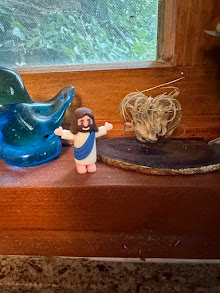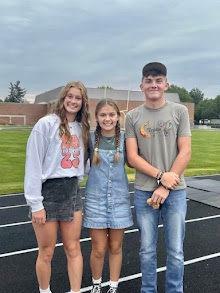Education is what remains after one has forgotten what one has learned in school.
~Albert Einstein
The dews of August bend the soybeans over and change the grass from green to silver. The sun has not yet awakened the cicadas of whatever cycle we are in, so the morning is still enough that I hear the bus coming from two miles off...even before the dust cloud is visible. It may still be summer, but today is the first day of school.
Inside our farm house, it is anything but quiet. The sink is full of breakfast dishes and Blake has stuck around to enjoy a second cup of coffee and see the kids off before heading off to work. There are backpacks on the floor and hair being fixed in front of the mirror in the bathroom. There are new shirts on their backs and new tennis shoes on their feet. I grab my camera for the first day of school picture. This is tradition: it will take its place in the scrapbooks that constitute our family history whether someone's eyes are closed, their mouth open, or the dogs disrupt the whole process.
*******
Like so much of memory, this vision is a composite. The little yellow Westboro bus first came to pick up Lee in 1984. A half day of kindergarten was deemed sufficient back then, but even though her sister would be home for lunch, Annie's mornings dragged on. She was ready to get on that bus and go to kindergarten, too.
Miss Walter was the kindest, gentlest introduction to public school that one could ever imagine. All three kids seemed to find a home in the cavernous room next to the school library, even Ann, whose childhood psychosis with regard to show and tell was only partially overcome in the last week of kindergarten. At that time, Miss Walter reported to us her success in "showing", if not "telling" about whatever she had taken to school that week. Never a big deal...just a smile about this particular unexplained foible at the end of each quarterly teacher's conference.
My grade school alma mater was Orland Park School, south of Chicago about 30 miles. The playground there in the 1960s was a wonder of height and speed and danger, just like the one at Westboro R-4. Back in the day, slides were steep and merry-go-rounds encouraged speed and risk and Lord only knows how many knocked out teeth and concussions. Westboro is the only place I've ever seen the thing my kids called 'the Tangler', but it must have been both hazardous and durable. The swingset at Orland was so tall that persistent pumping would allow a kid to reach the overhanging branches of the full grown oaks nearby. We never jumped from the swings at that playground because it was graveled, but out at Orland Center, the ground cover was grass and jumping from the swings was never discouraged by adult supervision because there was none until the bell rang to go indoors. We all adored our principal, Mr. Callahan. He was broad shouldered and always surrounded by yelling laughing kids that he would hoist and flip over his shoulder back to the ground.
The recent release of "The Man from U.N.C.L.E. movie reminds me that all the boys played Napoleon Solo and Ilya Kuryakin the year I was in 4th grade.
There were 'good' teachers and 'bad' teachers; I differentiated between the two by the level of chaos and disorder in the room. My second grade teacher was a tiny frantic young woman who hadn't a clue how to make peace with the swarming mass of baby boomers in her stuffy classroom, even though her successor, my third grade teacher, a stout scowling woman with a swarthy complexion, a moustache, and a bass voice, controlled the same group with sarcasm and the use of surnames. My hapless fourth grade teacher never finished a lesson and retired after our class passed through to fifth grade.
But Mrs. Broderick, our fifth grade teacher, ran a tight ship. She knew who was trouble before we sat down the first day and segregated them in the far row next to the windows. She assigned projects for every unit; I wrote reports about Antietam and constructed dioramas of Plains Indian villages and George Washington's camp at Valley Forge. Our class field trip was to Stateville Prison in Joliet. After school hours. At night. We had a sizable contingent of parent chaperones. Object lesson? Pre-emptive strike? From this distance in time, I can only presume. Mrs. Broderick was calm, collected, unflappable, steely and if I personally admired her, we all obeyed her.
But the disorder of the '60s was as close as sixth grade. Maps of North and South Vietnam were taped in the hallway. Mr. Swanson showed our class Russian propaganda films every week and taught us the Cyrillic alphabet, let us "learn" math on our own in the coat closet, and watch the World Series during class on the school's black and white television. He was laconic, 6'6", and cursed with a dreadful complexion. We rode roughshod over any class structure and wrote 100 sentences about how we would not be mean to our teacher for our transgressions.
I do remember the Russian words for 'window' and 'goodbye'.
My point? That children remember the teachers of their formative years far longer than anyone expects, for good and for ill. That order and structure...and chaos and confusion.... may leave a greater impression on kids not yet in their double digits than the thirst for knowledge.
And that the antidote to all that structure? To be permitted run faster, swing higher, and kick harder when it's time for recess....
Miss Walter was the kindest, gentlest introduction to public school that one could ever imagine. All three kids seemed to find a home in the cavernous room next to the school library, even Ann, whose childhood psychosis with regard to show and tell was only partially overcome in the last week of kindergarten. At that time, Miss Walter reported to us her success in "showing", if not "telling" about whatever she had taken to school that week. Never a big deal...just a smile about this particular unexplained foible at the end of each quarterly teacher's conference.
My grade school alma mater was Orland Park School, south of Chicago about 30 miles. The playground there in the 1960s was a wonder of height and speed and danger, just like the one at Westboro R-4. Back in the day, slides were steep and merry-go-rounds encouraged speed and risk and Lord only knows how many knocked out teeth and concussions. Westboro is the only place I've ever seen the thing my kids called 'the Tangler', but it must have been both hazardous and durable. The swingset at Orland was so tall that persistent pumping would allow a kid to reach the overhanging branches of the full grown oaks nearby. We never jumped from the swings at that playground because it was graveled, but out at Orland Center, the ground cover was grass and jumping from the swings was never discouraged by adult supervision because there was none until the bell rang to go indoors. We all adored our principal, Mr. Callahan. He was broad shouldered and always surrounded by yelling laughing kids that he would hoist and flip over his shoulder back to the ground.
The recent release of "The Man from U.N.C.L.E. movie reminds me that all the boys played Napoleon Solo and Ilya Kuryakin the year I was in 4th grade.
There were 'good' teachers and 'bad' teachers; I differentiated between the two by the level of chaos and disorder in the room. My second grade teacher was a tiny frantic young woman who hadn't a clue how to make peace with the swarming mass of baby boomers in her stuffy classroom, even though her successor, my third grade teacher, a stout scowling woman with a swarthy complexion, a moustache, and a bass voice, controlled the same group with sarcasm and the use of surnames. My hapless fourth grade teacher never finished a lesson and retired after our class passed through to fifth grade.
But Mrs. Broderick, our fifth grade teacher, ran a tight ship. She knew who was trouble before we sat down the first day and segregated them in the far row next to the windows. She assigned projects for every unit; I wrote reports about Antietam and constructed dioramas of Plains Indian villages and George Washington's camp at Valley Forge. Our class field trip was to Stateville Prison in Joliet. After school hours. At night. We had a sizable contingent of parent chaperones. Object lesson? Pre-emptive strike? From this distance in time, I can only presume. Mrs. Broderick was calm, collected, unflappable, steely and if I personally admired her, we all obeyed her.
But the disorder of the '60s was as close as sixth grade. Maps of North and South Vietnam were taped in the hallway. Mr. Swanson showed our class Russian propaganda films every week and taught us the Cyrillic alphabet, let us "learn" math on our own in the coat closet, and watch the World Series during class on the school's black and white television. He was laconic, 6'6", and cursed with a dreadful complexion. We rode roughshod over any class structure and wrote 100 sentences about how we would not be mean to our teacher for our transgressions.
I do remember the Russian words for 'window' and 'goodbye'.
My point? That children remember the teachers of their formative years far longer than anyone expects, for good and for ill. That order and structure...and chaos and confusion.... may leave a greater impression on kids not yet in their double digits than the thirst for knowledge.
And that the antidote to all that structure? To be permitted run faster, swing higher, and kick harder when it's time for recess....





















Thanks for linking up to the Country Fair Blog Party Julie! The first day of school started here for my kids and I have a feeling that the teachers they have this year will be memorable. For good reasons. :)
ReplyDelete